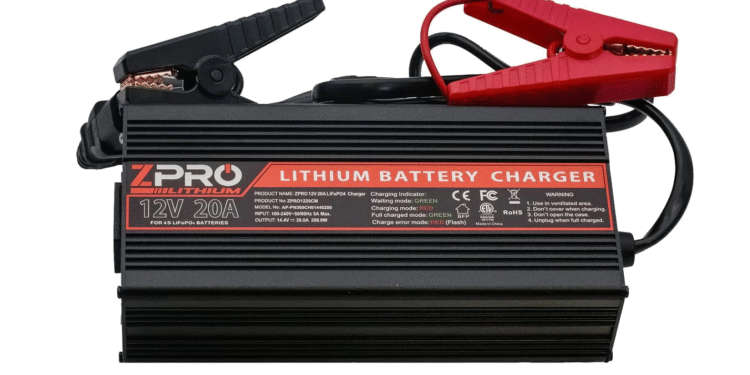In our age of portable electronics and electric vehicles, the lithium battery has become the cornerstone of modern power storage solutions. As with any investment in technology, maximising the lifespan of these batteries is paramount for both economic and environmental considerations. A critical component in achieving this is using the correct type of charger. This comprehensive guide aims to shed light on the importance of selecting the proper lithium battery charger and how it affects the longevity and performance of your lithium batteries.
Understanding Lithium Battery Chargers
Lithium-based batteries require specific charging parameters to maintain their health and stability. Unlike traditional lead-acid battery chargers, a lithium battery charger is designed to cater to the unique charging needs of lithium ions, which include voltage limits, temperature control, and charging cycles. Providing the right amount of energy at the correct rate is essential to preserve the intricate chemistry that allows lithium batteries to hold and discharge power effectively.
Why Choose the Right Charger?
Choosing the correct charger is not just about convenience; it’s about safety and efficiency. An inappropriate charger might not only reduce performance standards but can also lead to safety issues such as overheating or, in extreme cases, the battery catching fire. A high-quality charger intended for lithium batteries can regulate the power supply and prevent overcharging, thereby ensuring safety and enhancing the battery’s longevity.
Factors to Consider When Selecting a Charger
The market is saturated with various charging products, making the selection process sometimes daunting. However, several critical factors can guide you in the selection of an ideal charger for your lithium battery needs.
Charging Capacity
The capacity of the charger should correspond to the specifications of your battery. It must be capable of delivering the correct charge current that is neither too low (which could result in undercharging) nor too high (leading to overcharging).
Charging Rate
The charging rate, often referred to as the C-rate, affects how quickly the battery will charge. A low C-rate will mean a slower charge, thus reducing the risk of overheating but increasing the charging time. Conversely, a higher C-rate can shorten the charging duration but might induce more stress on the battery.
Battery Management System (BMS)
Many lithium battery chargers come with an integrated Battery Management System that monitors the battery’s state and controls the charging process to prevent damage. This system plays a crucial role in managing the cell balancing, temperature, voltage, and other critical parameters.
Proper Charging Practices for Lithium Batteries
Even the best lithium battery charger requires proper usage to ensure peak performance. Adhering to a few best practices can go a long way in extending the life of lithium batteries.
Avoid Deep Discharging
While lithium batteries can handle deeper discharges than other types, it’s best to avoid letting the battery drain completely. Repeated deep discharges can shorten the battery’s lifespan.
Maintain Optimal Temperature
Charging lithium batteries at extreme temperatures can be detrimental. Batteries prefer moderate temperatures, and most chargers regulate the temperature to prevent excessive heat, which can lead to capacity degradation.
Regular Charging Cycles
It’s beneficial to maintain regular charging cycles rather than infrequent, complete discharges. This helps keep the battery in good health and prevents a decrease in its capacity over time.
Investing in a Quality Lithium Battery Charger
Purchasing a charger from a reputable source with positive reviews and proven quality standards is crucial. Leading brands and suppliers offer warranties and gratifying customer support, ensuring that you get the most out of your investment.
Compatibility and Certifications
Always check for compatibility between the charger and your specific lithium battery. Additionally, look for certifications that indicate safety standards, such as CE, UL, or RoHS.
Advanced Features
Some chargers come with advanced features such as smart charging, which adjusts the charging rate based on the battery’s condition, or LED indicators for easy monitoring of the charging process.
The Importance of Following Manufacturer Instructions
Following the manufacturer’s guidelines for your specific battery and charger can prevent mistakes that might otherwise lead to reduced battery performance or potential hazards.
Conclusion
As the reliance on lithium batteries grows, understanding the significance of the right lithium battery charger becomes increasingly important. Not only does it ensure safety and efficiency, but it also plays a crucial role in prolonging the lifespan of the battery. Whether for personal devices, vehicles, or industrial applications, the appropriate charger is an investment towards sustainability and cost-effectiveness in the long run. By considering the factors outlined in this guide, you can make an informed decision that will serve you well into the future.
Final Recommendations
In conclusion, when it comes to choosing a lithium battery charger, it is imperative to consider the charger’s capacity, charging rate, the inclusion of a BMS, and the safety features it offers. Furthermore, investing in a quality charger from a reliable supplier enhances not only the performance but also the longevity of your lithium batteries. With diligent care and the correct charging protocols, users can enjoy optimal performance from their lithium-based power sources for years to come.













